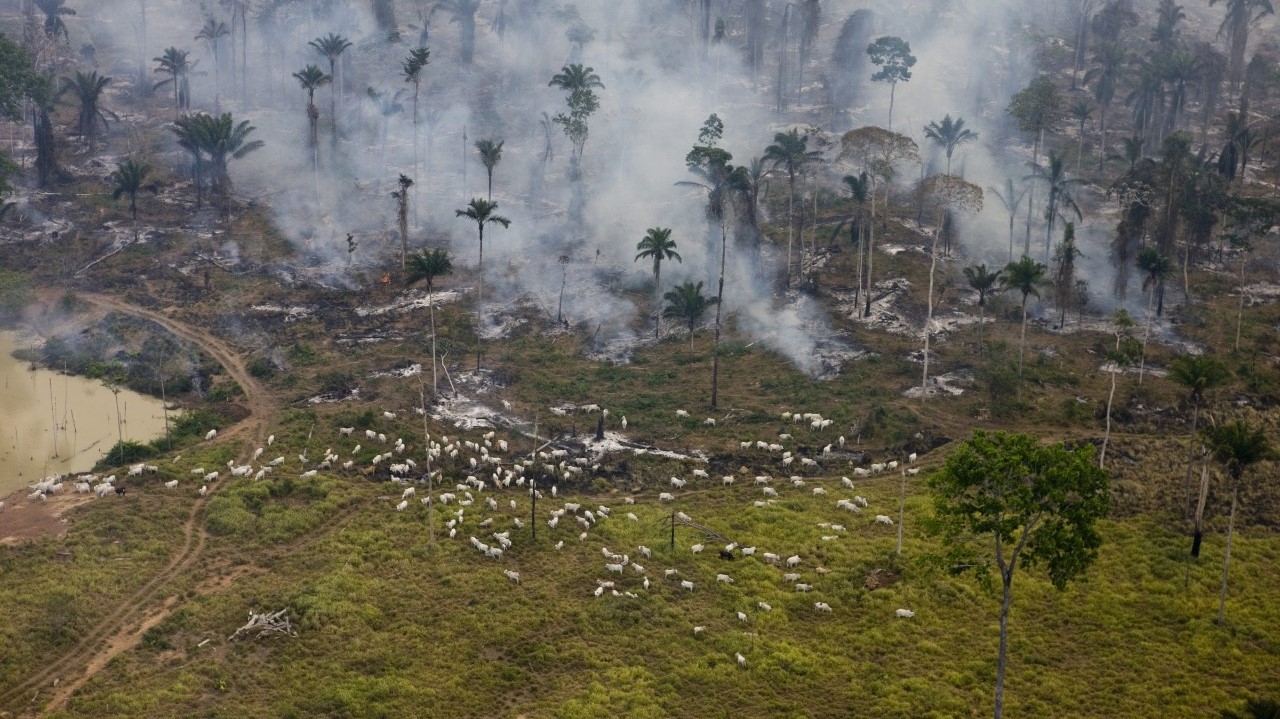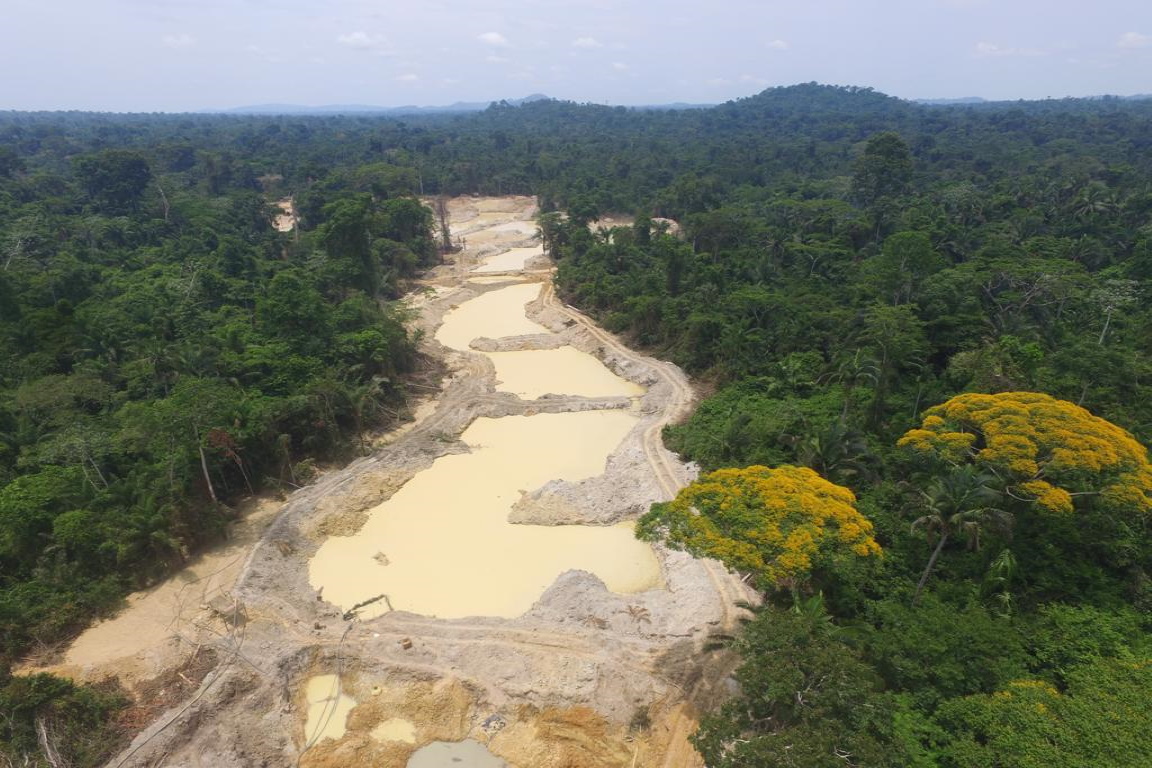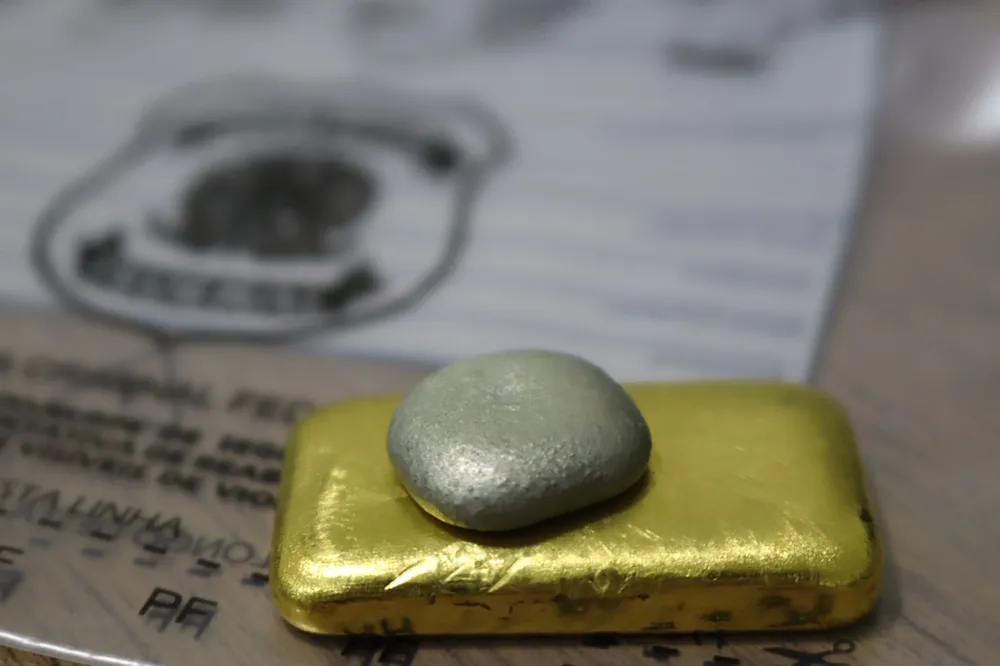
With 10% of its territory already deforested and almost 500 fire outbursts in the past year alone, part of the Apyterewa Indigenous Land (IL) in Pará is turning into pasture. And large multinational meat companies such as Marfrig – as well as regional ones like Frigol and Mercúrio – directly and indirectly source cattle from ranchers who raise cattle illegally in that protected area of the Amazon. These companies, in turn, supply the main supermarket chains in the country.
An agreement signed in 2009 by meat companies and the Federal Prosecution Service (MPF) bans the slaughter of cattle from illegally deforested farms, environmental reserves, and indigenous areas. However, a new investigation by Repórter Brasil identified the strategies used by ranchers to circumvent restrictions and give an appearance of legality to livestock illegally fattened at Apyterewa. In general, they rely on intermediary farms outside the indigenous territory to sell cattle raised in banned areas.
“Staff from [Brazil’s Indian Affairs Agency] Funai counted around 50 thousand heads of cattle in the indigenous land in March 2016,” says Nilton Tubino, who used to work at the Office of the Chief of Staff of the Presidency. He was one of the supervisors of the “disintrusion” process – a technical term for the removal of non-indigenous occupants from indigenous lands.
Officially given to the Parakanã people by a Presidential executive order in 2007, the Apyterewa Indigenous Land has face encroachers for years. A note released by the Parakanã stated: “As the world faces a pandemic, many non-indigenous people, encouraged by speeches and actions of several politicians, take the opportunity to increase encroachment into our territory, perpetrating crimes against our people and the Brazilian nation. We want our territory to be free from encroachers.”
“Many people who raised cattle there did not own the animals. They brought someone else’s animals for fattening,” Tubino explains. “We were there, and we saw the trucks passing by. Someone was ‘laundering’ the cattle for them,” he adds.
In this case, ‘laundering’ refers to the schemes created by ranchers to give an appearance of legality to cattle raised irregularly within the indigenous land. The cases analysed by Repórter Brasil show a variety of ploys used for that purpose. They also reveal how meatpacking companies’ monitoring systems still have flaws, especially when it comes to indirect suppliers.
An example of that is the Lucélia Farm, with 1,427 hectares overlapping Apyterewa. Documents obtained by Repórter Brasil show that, in December 2019, a shipment of cattle was sent to a rural property outside the indigenous land – the Carajás Farm. In the first three months of this year, the farm traded animals with Mercúrio’s meatpacking plant in Xinguara, PA.
Repórter Brasil tried to contact Antônio da Silva Arruda and Geremias Rocha de Freitas, respective owners of the Lucélia and Carajás farms, but could not locate them. Mercúrio was also asked about the purchase of cattle from the Apyterewa IL but had not responded until this article was finished.
Pirate cattle
The second case involves rancher Antonio Borges Belfort, who ran for city councillor in São Félix do Xingu in 2016 but was not elected. He owns Sol Nascente, one of the largest deforested farms in the Apyterewa IL, with almost 2,000 hectares. Between February 2018 and July 2019, dozens of animals were transported from that farm to another property belonging to Belfort and located outside the indigenous land – the Serra de Pedra farm. The two properties are included in the declaration he submitted to Brazil’s Higher Electoral Court (TSE) as a candidate. The value of the farm located within Apyterewa is estimated at BRL 1.1 million.
However, Serra de Pedra’s productivity raises suspicions. According to Program Boi na Linha, created by NGO Imaflora together with the Federal Prosecution Service and ratified by the country’s main meatpackers to curb fraud in the industry, the maximum productivity of a rural property in the Amazon hardly goes beyond three animals per hectare per annum.

This means that Serra de Pedra, with only 20 hectares of pasture according to the Rural Environmental Registry (CAR), would be able to supply 60 animals per year. However, in 2019, Marfrig’s plant in Tucumã, PA alone slaughtered 135 animals from that farm. Frigol’s plant in São Félix do Xingu also received hundreds of animals from the property.
The data indicate that Serra de Pedra would not be able to supply such a large number of cattle heads to slaughterhouses. The math reinforces the suspicion that they were originally bred on Antônio Borges Belfort’s farm located within the indigenous land.
Marfrig recognizes that the Serra de Pedra farm has ‘6.61 cattle heads per hectare’ – more than twice the figure set by Program Boi na Linha. The company’s statement also says that its criteria for cattle sourcing will be updated by July 2020. The company’s full answer can be read in Portuguese here.
“We want our territory free from encroachers”, the Parakanã say.
Frigol, in turn, says that the last cattle purchase from the property took place in August 2019. According to the statement, it was only in February 2020 that the company became aware of the productivity index established by Program Boi na Linha, even though it has not been “officially notified by the Prosecution Service about the new monitoring rules to be established.” The company also guarantees that it is already “taking steps to comply with the new protocol.”
Cattle rancher Antônio Borges Belfort was contacted by the president of a rural producers’ association at the request of Repórter Brasil, but he said he would not comment.
Supplier ‘within the margin of error’
Marfrig’s slaughterhouse in Tucumã, whose operations were shut down in March this year, also received cattle from a third farm investigated by Repórter Brasil. Between May 2018 and December 2019, the meatpacker received animals from the JR Farm. Eight percent of the property’s area overlaps the Apyterewa Indian Land, according to CAR coordinates. The CAR is a self-declaratory registration, that is, its information is provided by landowners themselves.
However, according to Funai maps and spreadsheets, rancher José Roberto Alves Resende, owner of the JR Farm, appears in the list of producers established inside Apyterewa. He claimed an area of 100 hectares within the indigenous land, but the federal agency considered it possession in bad faith. Resende was not located to clarify doubts about the precise location of his farm and about raising cattle in indigenous territory.
Marfrig states that the coordinates of the JR Farm that appear in the CAR place the property within the margin of error provided for in a rule issued by the competent authorities in 2010. “The equipment used for demarcation in the past was not as accurate and did not have the technology available today,” the statement says. The company argues that, in order to mitigate possible cartographic errors, the methodology used to analyse [land] overlaps considers a 10% tolerance margin. To read the full answer, click here.
The Parakanã: harassed in their own territory

Located in São Félix do Xingu, Pará, where there are 17 heads of cattle per resident, the Apyterewa Indigenous Land has been the target of illegal activity not only by cattle ranchers, but also by miners, loggers, and land grabbers. The situation is so critical that, in January, the Federal Prosecution Service asked Funai (Brazil’s National Indian Foundation) to resume the activities of the Working Group (WG) on disintrusion in Apyterewa.
“Funai is resisting to carry out disintrusion, and we are trying to overcome it,” says Federal Prosecutor Robert Lucht. In March, the Prosecution Service filed a lawsuit in a Federal Court asking the Federal Government to pay a daily fine of BRL 5,000 until non-indigenous people are removed. Funai had not commented until this article was published.
“Unfortunately, environmental violations have also increased there,” Lucht adds. That is why the Prosecution Service ordered Ibama (The Brazilian Institute of the Environment and Renewable Resources) to carry out inspections at Apyterewa.
In April, after an operation that apprehended irregular mining equipment in three indigenous lands, including Apyterewa, two of Ibama’s head inspectors lost their positions at the agency. The destruction of the machines displeased president Jair Bolsonaro. He had already signalled to miners about the possibility of revoking an executive order authorizing the destruction of equipment used for illegal mining. To date, the promise has not been kept.
“Funai is resisting to carry out disintrusion, and we are trying to overcome it”, explains Federal Prosecutor Robert Lucht
“Even after it was officially approved and regularized, the Parakanã people do not have full possession over the Apyterewa, causing their communities to be harassed in their own territory and live in permanent insecurity, both physical and cultural,” says Aluisio Azanha, a member of the Special Commission for the Defence of Indigenous Rights of the Brazilian Bar Association’s (OAB) Federal Council.
While Apyterewa’s homologation as indigenous territory has already been recognized by the Supreme Federal Court (STF), a provisional injunction granted on May 26 by Justice Gilmar Mendes summoned the Union for a proposed ‘conciliation.’ The measure encouraged the squatters who refuse to leave the indigenous land and worried those who work to preserve the territory of the Parakanã people.
Prosecutor Robert Lucht questions Justice Mendes’s decision. “There is no conciliation at this point. Not least because the encroachers filed numerous lawsuits and they have been tried at first and second-level jurisdictions, at the Superior Court of Justice and the Federal Supreme Court, and no decision has favoured them so far,” he adds.
Leaders of the Parakanã people released a note criticizing Justice Mendes’s decision. “We, the Parakanã people, do not accept the attempt at conciliation, since agreements have been signed in the past and the squatters kept encroaching on our territory,” the document reads. “The government owes us the eviction and removal of all non-indigenous people from our land.”
An old problem
During the process of demarcation of the Apyterewa IL in the 2000s, Funai identified 1,175 squatters in the area, according to data obtained by Repórter Brasil through the Access to Information Act. Of this total, the agency recognized 292 as occupants in good faith and therefore entitled to compensation for improvements. The other 883 were considered to be in bad faith, with no right to the land where they were. In all, BRL 6.8 million have already been paid by the Union in compensation for the removal of the squatters.
About 300 families were transferred to the Belauto Settlement Project in São Félix do Xingu. However, some squatters who had left the indigenous land ended up returning.
“They came back because they were thrown into the settlement without any condition, negligible compensation, which doesn’t even cover their moving expenses,” explains Vicente Paulo Lima, president of the Vale do Cedro Association, which went to court to challenge the demarcation of the Apyterewa IL.
New squatters also settled in the Parakanã territory. According to Lima, around 2,500 families are currently living in the area. He remains on the same farm, within the indigenous area, and demands that the anthropological analysis that supported the Apyterewa demarcation be conducted again.
The removal of non-indigenous occupants from Apyterewa was set by a 2009 court decision. Two operations with this aim were carried out by the Federal Government until 2016, without success. The removal of squatters was a socio-environmental condition to build the Belo Monte dam, on the Xingu River.
“Given the current political scenario, it tends to get worse, with encroachment increasing, occupations consolidating, conflicts getting harsher, and the harassment of Parakanã leaders intensifying,” says OAB’s Aluisio Azanha.

